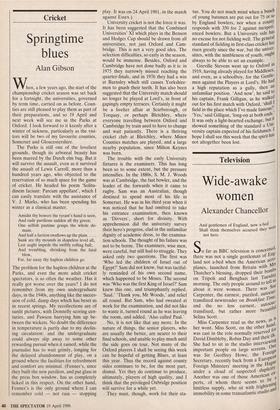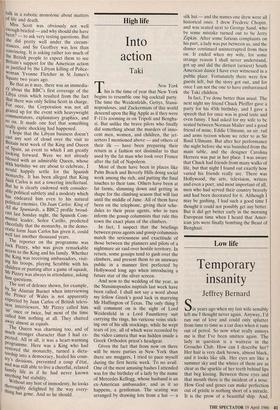Television
Wide-awake women
Alexander Chancellor
And gentlemen of England, now abed c Shall think themselves accursed they wet not here.
So far as BBC television is concerned, there was not a single gentleman of Eng- land not a-bed when the American aero- planes, launched from Britain with Mrs Thatcher's blessing, dropped their booths on Tripoli and Benghazi last Tuesday morning. The only people around to tell Lis about it were women. There was Sue Carpenter, the earnest, puzzled, autocue' transfixed newsreader on Breakfast Tune' and the no less earnest, autocue" transfixed, but rather more beautiful Selina Scott. Miss Carpenter read us the news, as ,is her wont. Miss Scott, on the other hand, was cast in the role normally reserved .1°' David Dimbleby, Robin Day and their 1.11c* She had to sit in the studio interviewil important people on large screens. 011 was Sir Geoffrey Howe, the Foreign Secretary, recently back from a European e Foreign Ministers' meeting in the Hae‘, under a cloud of suspected duplicit7, a Another was one of those American ex perts, of whom there seems to be, limitless supply, who sit with frighreall immobility in some transatlantic studio aa talk in a robotic monotone about matters of life and death.
Miss Scott was obviously not well enough briefed — and why should she have been? — to ask very testing questions. But she did pretty well under the circum- stances, and Sir Geoffrey was less than convincing. It is asking rather too much of the British people to expect them to see Britain's support for the American action as justified by the Libyan killing of Police- woman Yvonne Fletcher in St James's Square two years ago. Be that as it may, there was an immedia- cy about the BBC's first coverage of the Libya crisis which resulted from the fact that there was only Selina Scott in charge. For once, the Corporation was not all geared up for the event with heavyweight commentators, explanatory graphics, and so on. It made one feel that something really quite shocking had happened. I hope that the Libyan business doesn't cast any sort of cloud over the visit to Britain next week of the King and Queen of Spain, an event to which I am greatly looking forward. Were we not already blessed with an admirable Queen, whose 60th birthday we are about to celebrate, I would happily settle for the Spanish monarchy. It has been alleged that King Juah Carlos is not a towering intellectual. But he is clearly endowed with consider- able political subtlety and a modesty which has endeared him even to his natural political enemies. On Juan Carlos: King of All the Spaniards, a BBC2 profile broad- cast last Sunday night, the Spanish Com- munist leader, Sefior Carillo, predicted cheerfully that the monarchy, in the demo- , cratic form Juan Carlos has given it, could Well last another thousand years. The reporter on the programme was Jack Pizzey, who was given remarkable access to the King and his family. Whether the King was receiving ambassadors, visit- ing his troops, playing Scrabble with his children or panting after a game of squash, Mr Pizzey was always in attendance, asking him questions. The sort of defence shown, for example, by Sir Alastair Burnet when interviewing the Prince of Wales is not apparently expected by Juan Carlos of British televi- sion interviewers. Mr Pizzey called him sir' once or twice, but most of the time called him nothing at all. They chatted away almost as equals. The Queen was charming too, and of much stronger character than I had ex- pected. All in all, it was a heart-warming Programme. Here was a King who had restored the monarchy, turned a dicta- torship into a democracy, healed his coun- try's divisions, prevented a coup d'etat, and was still able to live a cheerful, relaxed family life as if he had never known anything but stability. Without any hint of immodesty, he looks thoroughly delighted by the way every- thing has gone. And so he should.



















































 Previous page
Previous page